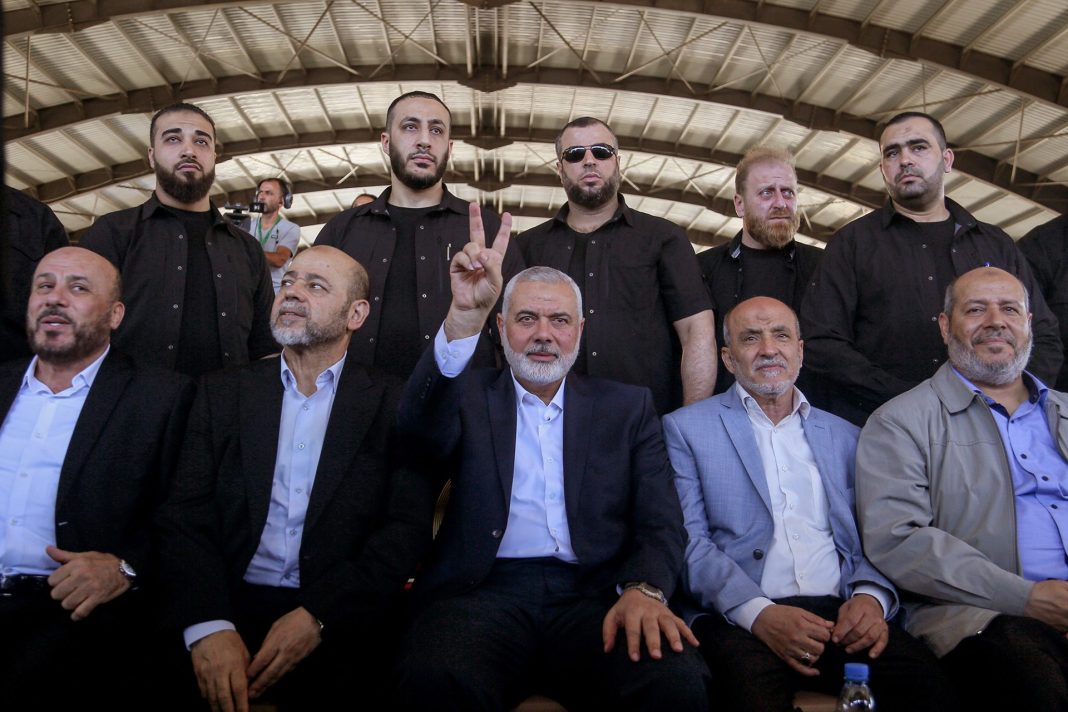The Palestinian group’s political leader Ismail Haniyeh confirmed on Tuesday that he is studying the proposal, thrashed out in Paris over the weekend, to halt the war and enable the exchange of Israeli and Palestinian prisoners.
Haniyeh said in a statement that the group is “open to discussing any serious and practical initiatives or ideas, provided that they lead to a comprehensive cessation of aggression”.
Hamas also added that the plan must ensure the “complete withdrawal of the occupation forces from the Gaza Strip”.
The group’s leadership, he stated, had received an invitation to Cairo to reach an “integrated vision” on the framework agreement.
In a statement sent to Reuters, Hamas said the proposal involved three stages. The plan has been sent to Gaza to obtain the opinion of Hamas leaders there.
“The Hamas leadership will meet to discuss the paper and express its final opinion on it,” the statement added.
Sources told the news agency that the first phase would consist of a pause in fighting and the release of elderly, civilian women and children hostages.
Major deliveries of food and medicine to Gaza, facing a ruinous humanitarian crisis, would resume.
The second phase would see the releases of female Israeli soldiers and another increase in aid deliveries and restoration of utility services to Gaza. The third phase would see the release of the bodies of deceased Israeli troops in exchange for Palestinian prisoners freed, two sources said.
The Hamas statement added the second phase would also involve the release of male military recruits.
“Military operations on both sides will stop during the three stages,” it said. The number of Palestinian prisoners to be released is to be left to the negotiation process “at every stage, with the Israeli side preparing to release those with high sentences”.
The ultimate aim of this phased approach is the end of the war and the release of male soldiers held captive in Gaza in exchange for Israel’s release of additional Palestinian prisoners held in jail.
If Hamas does agree to the framework proposal it could still take days or weeks to settle logistical details of the truce and the release of hostages and prisoners, an official told Reuters.
Qatar’s Prime Minister Sheikh Mohammed bin Abdulrahman bin Jassim Al Thani said the framework discussed in Paris is based on elements of an initial proposal made by Israel and a counterproposal made by Hamas.
“We tried to blend things together to come up with some sort of reasonable ground that brings everybody together,” he stated at Washington’s Atlantic Council think tank on Monday.
He added that “good progress” was made on a possible deal during meetings between intelligence officials from Egypt, Israel and the United States over the weekend.
The Qatari prime minister noted that Hamas has previously demanded a permanent ceasefire as a precondition to enter negotiations. However, he suggested that there is hope its stance may have shifted.
“I believe we moved from that place to a place that potentially might lead to a ceasefire permanently in the future.”
The Palestinian Islamic Jihad group in Gaza has also announced it will not engage in any understandings regarding Israeli hostages without ensuring a comprehensive ceasefire and the withdrawal of the Israeli forces from the Gaza Strip, the group’s secretary general Ziad al-Nakhala said in a statement on Tuesday.
Prime Minister Benjamin Netanyahu on Tuesday said Israel would continue its war in Gaza until “absolute victory” over Hamas.
He ruled out releasing “thousands” of Palestinian prisoners as part of any deal to halt the fighting and said the army would not withdraw from Gaza.
“I would like to make it clear… We will not withdraw the IDF [army] from the Gaza Strip and we will not release thousands of terrorists. None of this will happen,” he said in an address at Eli settlement in the occupied West Bank.
Netanyahu is under significant pressure from the families of the remaining captives held by Hamas to reach a deal to secure their release.
Hamas killed at least 1,139 people in Israel and took about 250 captives on October 7, according to Israeli figures.
However, Netanyahu is also being pushed to continue the war by hardline coalition partners in his government.
